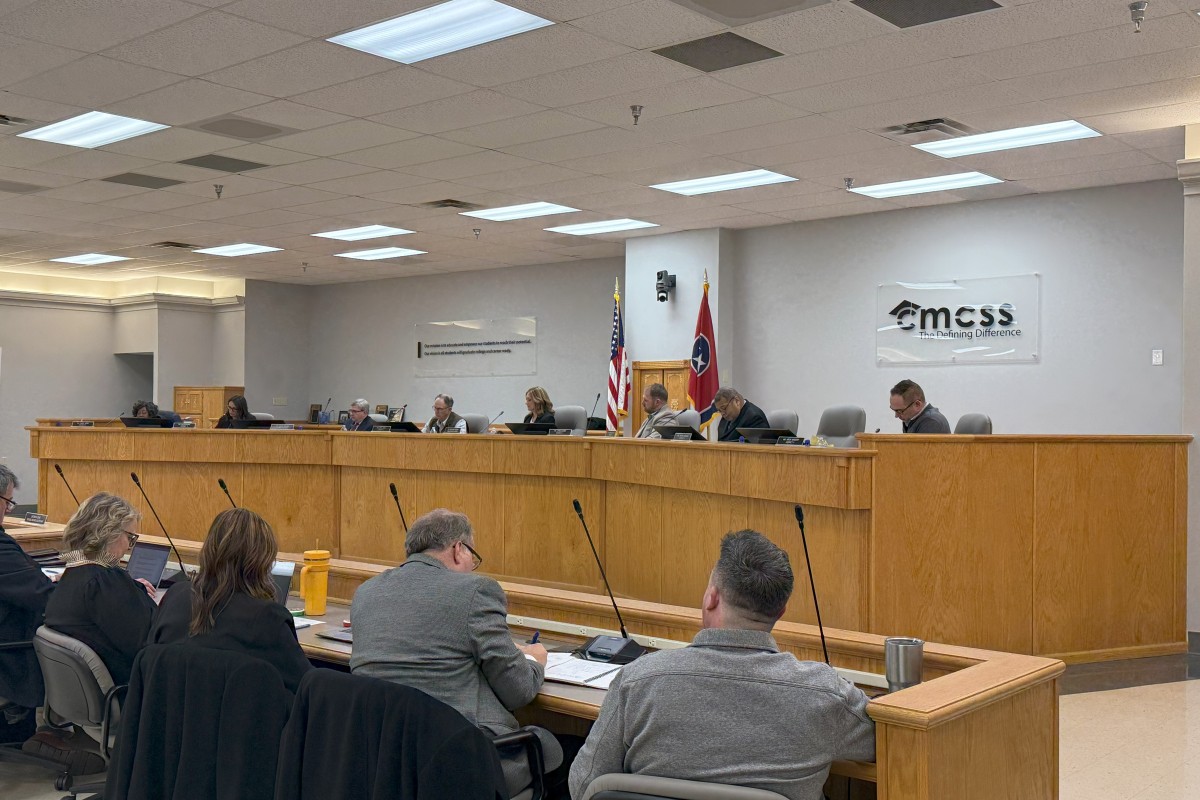CLARKSVILLE, TN (CLARKSVILLE NOW) – The Clarksville-Montgomery County School Board has adopted a “blackout” policy that bans students from using cellphones during the school day.
On April 1, Gov. Bill Lee signed a bill into law that requires school boards to adopt a more stringent policy that prohibits students from using “wireless communication devices” during instructional time, except in certain circumstances.
“The reason I started with this is not the intention to take away phones from students,” said board member Chris Lanier, who spearheaded the local policy change. “The whole act of this is to make sure they (students) get back to regular instruction time.”

Current cellphone policy
The current cellphone policy is a bit more relaxed and entrusts most of the authority and responsibility for policy enforcement and compliance to school administrators. According to the current policy in the CMCSS Student Code of Conduct, “Use of cell phones other than those required for instruction purposes is prohibited.” This policy entrusted individual schools to develop and communicate expectations for compliance.
The current policy lists violations as a Category 1 offense, which are typically handled at the classroom level by the teacher. The range of consequences, depending on repeat offenses, includes detention or in-school suspension for one to three days. Intervention measures allowed for school counselor referral or tiered behavior intervention.
On Tuesday night, board member Aron Maberry said that current rules left too much room for students to get distracted, saying, “This is how they are organizing fights and things like that.”
“To allow them to have the cell phones, not in instruction time, but then in the hallways, during lunch – it doesn’t make a lot of sense to me that we’re going to then allow them to have that and then they can still organize and do the things which we are concerned about right now,” Maberry said.
‘We aren’t running prisons’
Maberry suggested an amendment to the proposed changes: a cellphone blackout during the instructional day.
According to the new state legislation, school boards and governing bodies were only required to adopt a policy that prohibits cellphone usage during “instructional time” – the specific hours and minutes dedicated toward teaching and learning, for instance, an Algebra class. That doesn’t include walking to the next class, breaks or lunch time.
“Instructional day” is a broader term encompassing the entire school day from the moment the student walks in the building to the moment the dismissal bell rings. Maberry’s recommendation of a cellphone blackout applies to the instructional day.
| GET YOUR MORNING NEWS: Sign up for the free daily Clarksville Now email newsletter
Board member Jimmy Garland objected to the proposal.
“We are not running prisons – we’re running a school system. We’re running places where children come to be educated,” Garland said. “The teachers need to be in a safe environment, I understand that, but we shouldn’t be treating these kids like they are criminals.”
Lanier responded that when he started this effort to review the cellphone policy, it wasn’t his intention to take phones away from students. “They still have them in their backpacks, they’d still have them in the classroom if anything ever were to happen. … If they had to flee the building, they’d still be safe and be able to communicate with their parents.”
2025-26 cellphone blackout approved
Including Maberry’s amendment, the new cellphone policy overhauls the prior policy.
According to the new rules, “Use of cell phones and other personal electronic devices during the instructional day is prohibited. Students will be expected to turn their phones off or put them on silent and out of sight for the entire instructional day. Students are prohibited from having their phones or personal electronic devices out in class or in the hallways during passing periods.”
Violations of the policy have been shifted from a Category 1 to a Category 2 offense. Category 2 offenses result in a discipline referral being submitted and addressed by a school administrator or designee. Repeated Category 2 violations could lead to out-of-school suspension. If the student violates this policy a second time, they could face up to five days of administrative detention.
In addition to administrators, staff and teachers now have the authority to confiscate cellphones. Confiscated cellphones are locked in a secure area and are returned to the student at the end of the school day.
However, there are exceptions for special situations. The principal may approve use of cellphones or personal electronic devices for instructional purposes on a case-by-case basis, and the building principal may designate a specific time, such as lunch, when students may use cellphones or specific personal electronic devices.
Assured that students would still have access to their cellphones in case of emergencies, the board took the new proposed changes to a vote. It passed unanimously.
| WANT MORE LOCAL NEWS? Sign up for our free Clarksville Now app


